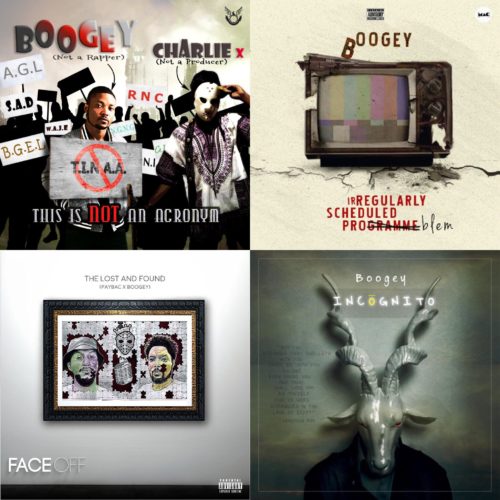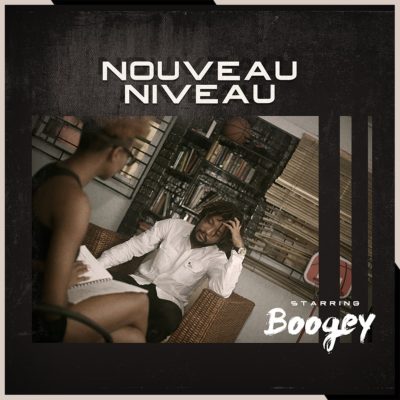There’s a nice paradox to Boogey’s “Not A Rapper Tho” – the intro to This Is Not An Acronym, the 2015 collaborative mixtape with masked producer Charlie X – in that, apart from its not so subversive title, the comic relief offered by interjected, hilarious pseudo-freestyles by viral sensation Poodieville, does little to mask the amount of seriousness and insecurity the song portrays concerning Boogey’s career as an artist.
“Not A Rapper Tho” sprung out of a man who knew his abilities as rapper were solid, but was grappling with the reality of sublimating dreams, from signed hype to unsigned – the initial buzz had cooled off. Life had taken away the lemons, but Boogey still had to make lemonade in the hopes that people would be interested enough to turn up to his yard sale.
Saturating the interweb with new music – 3 full length projects in 2016 alone – helped in regaining some of Boogey’s buzz, including getting to number 1 on Spinlet with Faceoff, a joint album with Paybac. With each independently helmed and released project, a devoted fanbase continue to accumulate, however small. The music was far from perfect – hard to ask for perfection from an artist who’s wading through tides – but it was enough, especially since it seemed like Boogey was improving with each output.

Released last Friday, Nouveau Niveau is another installment in the improvement series, albeit a lot more monumental since it’s Boogey’s solo debut album. It’s the most polished body of work Boogey has mustered yet, consisting a crispier sonic sheen than his past works. The album boasts a conglomerate of haunting, soulful aesthetics and woozy bangers, supplied by a plethora of producers, ranging from Black Intelligence’s sunny, jazzy bops to ear assaulting synths from Asuzu and Charlie X.
Lyrically, Nouveau is like an app update, rethreading paths Boogey has gone down before, with renewed conviction and vigor.
An immediate standout track is the Charles Prythm produced “Level VI,” a song that could easily be termed staple material, since Boogey’s shown time and again that rapping showily about his niceness in front of a mic is soft work for him. The same reason why “Level VI” should be considered trite is exactly why it works, Boogey coolly throwing off quotables around, in relation to quips about his continued tenacity and high skill level over a perfect combination of dusty boom bap drums and piano string riffs is like jollof rice – you know you’re getting it at every function, but you’re really good with it.
A big reason why there’s sufficient intrigue in topic recycling is the importance of lyricism as Boogey’s forte, his creativity with his pen and blitzy flow being primary assets. As well as these traits work in favor of Nouveau as a straight up rap album, being too rushy, at times, makes it sound like he can’t comfortably arrange his flurry of innovative expressions as well as he can conjure them. It’s in moments like this that reveal how far behind he is as a premium music maker. Case in point; the Kid Konnect produced “Happily Never After,” where his lines are being crammed in to fit, like a tiny glove being forced to fit into O.J Simpson’s hand.
The off-the-wall flow is not a novelty, though, hitting way more times than it misses, never mind my excessive complaints about the sometimes dizzying speed of Boogey’s rapping during my 1-listen review. A jaw dropping feat is the humanly impossible number of syllables Boogey fits into each bar at the manic, tail end of the second verse on “Don’t Listen To This (I’m Wack II)” – it’s poetry on Tesla wheels that you can’t help but admire. The song itself, being satirical, is premium banter at the unintelligence of non-lyrical hip-hop, packing with it the eyeballing angst of those in the traditional rap corner over a delightful, jittery trap beat.
Such brilliant madness can only be achieved from a constant and genuine love for rap, matched only by continuous practice – Boogey tweeted a few years back that he raps while walking in order to practice breath control. So, there’s some justification for Boogey – as a rapper who puts plenty of effort into his craft – going after purveyors of wack, banal hip-hop music as much as he wishes, even if there’s a bit of underlying bitterness. Hard to not be mad when you’re putting in a mountain of effort and getting just more than a molehill of recognition.
There’s an unflinching devotion to poetry engrained in Boogey’s artistry, give him a beat, no matter how melodious, and he’s determined to rap over it. But the less than favorable commercial acceptance his chosen path has afforded Boogey has definitely caused wear and tear despite the doggedness.
Wrapped with this dissatisfaction, Boogey’s late 2016 mixtape Incognito colored itself suede black, and the same aura naturally extends into Nouveau. With the album art depicting a therapy session, Boogey throws down more than a few frames of catharsis. An emotionally defining cut is the Lady Donli assisted “Motions,” on which Boogey’s tirades erupt into a few bursts of vengeful wishes at unnamed but specific targets who seem to have derailed the upward trajectory of his career, from the deceit of former label execs to those who have asked him to dumb his music down for more approval. “I hope they die from a virus or some irregular sickness,” Boogey bellows with all the anger he can muster.
The vindictive mindset that is eminent on Nouveau doesn’t fully absolve its protagonist too, laying a big chunk of the blame at his own feet on the somber, gut grabbing closer “Nobody’s Fault.” Boogey rapping “It will take a hell of a feat to repair me” only heightens how convoluted the emotions on display are, and the irony of how much Boogey has settled into the same web that he seems to be untangling.
One of the refrains on album opener “Just A Man,” goes “breathe in and hum, be calm,” an attempt at inducing a zen-like state. Surrounding those self implorations, though, is taunts from within and without that only amplify inner chaos. The other refrain “sometimes I think I’m one of y’all,” (sorta) captures the inner workings of how Boogey grapples with the brunt of being underappreciated, even if he believes his gift puts him on another level of clarity.
A word document is attached to the full version of Nouveau, containing a short story titled “2090, I remember.” Tapping into clairvoyance and narrated in first person, “2090” is set in a dystopian future, where almost everything is dysfunctional. There is a little color of hope peeking out, but Boogey’s storytelling is largely nihilistic, bordering on being stoic. It’s an extension of the huge amount of negativity in Boogey’s headspace, drawing parallels with how a degenerating society is traveling down a destructive road.
It’s easy to infer that a self-aware artist like Boogey would be aware of the ills of his society (especially if you follow his Twitter for some controversial hot tea), and “2090” isn’t the only socially conscious piece attached to Nouveau. Featuring a mantra stuffed hook, powerfully sung by Onosz, “Different Strokes” is an apt piece of commentary for the social media age, where data is jet fuel and tweets carrying standards fly around on a regular. “How you let social media confuse you niggas?” Boogey questions, sounding perplexed.
Question marks also surround “Voice Of God,” this time aimed at religious beliefs. The crackling standout track finds Boogey theorizing on the abstract nature of faith, the tenuous nature of biblical tales and the overall divisive effect religion has had due to variety of teachings. It’s the type of bold blasphemy that will throw any overly religious person into a convulsive fit. “Voice Of God,” like the other tracks on Nouveau, isn’t the first time he’s expanding on a similar idea, but the allure lies in combination of a rejigged pen and a renewed vigor.
Although massively talented as a wordsmith, there’s wisdom in Boogey knowing his limitations, especially in enlisting the support of singers to inject melodic variety into Nouveau, most of these contributions being memorable. Tay slips into “Liquor Nights” majestically, Jazzz’s drawly scats adds purple hue to the heartbreak tale on “Solo,” Sojay adds extra snap to “Heaven Can Wait,” and Jane Sam’s soul reaching feature amplifies inner chaos on “Message To Heaven.”
Besides Samibond’s mealy hook which thankfully fails to bar “Prayer” (he does get redemption points for producing “Nobody’s Fault”), every other vocal assist furthers the effectiveness of Boogey’s portrait on Nouveau Niveau, helping to create a mostly riveting front to back album.


